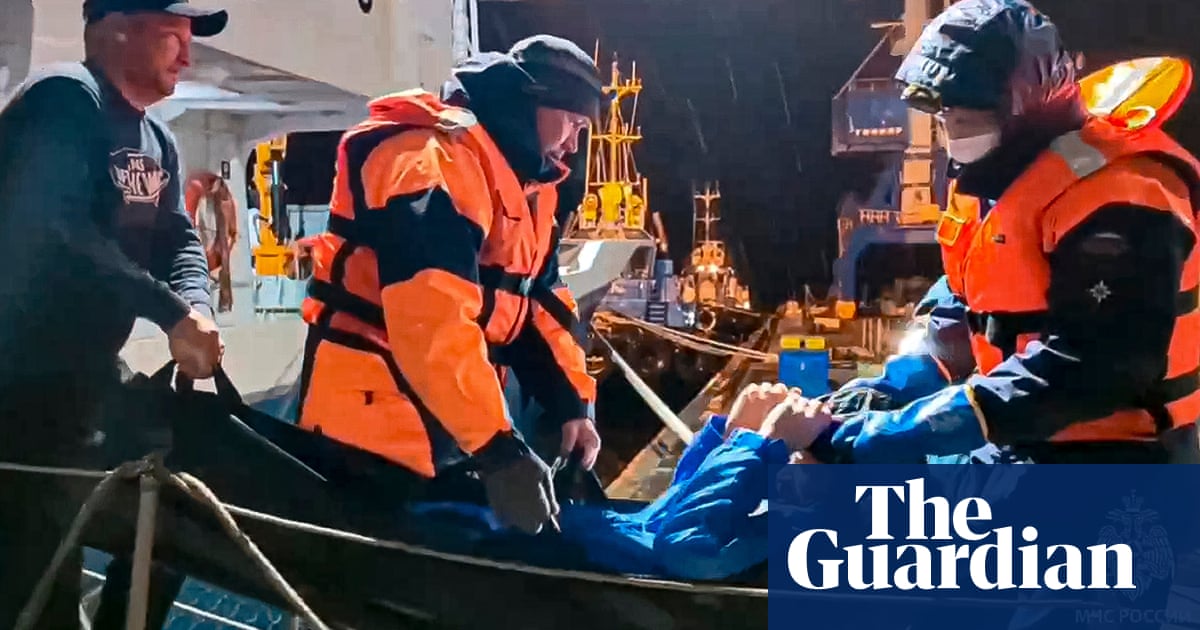A Russian man survived more than two months drifting in icy seas on an inflatable boat in an ordeal that claimed the lives of his brother and teenage nephew, officials and reports said.
Mikhail Pichugin may have survived because of his 100kg (220lb) build, according to his wife. Media reports said he weighed just 50kg when found on Monday.
Pichugin, his brother and his 15-year-old nephew set off for Sakhalin island from the far eastern Khabarovsk region on 9 August on an inflatable catamaran, transport prosecutors said.
The boat was discovered at about 10pm on Monday as it floated past a fishing boat in the Sea of Okhotsk, about 1,000km (670 miles) from its starting point and 66 days after it had set off.
A video posted by prosecutors shows a bearded man in a lifejacket shouting at the fishermen: “I don’t have much strength.” He managed to catch a rope.
The survivor was named by RIA Novosti news agency. The bodies of his brother Sergei, 49, and nephew Ilya, 15, were still on the boat.
Rescuers had mounted a helicopter and plane search for the trio a few days after they disappeared, suspecting the boat had been carried by currents towards Kamchatka.
Pichugin’s wife, Yekaterina, told RIA Novosti: “It’s a kind of miracle.” She said the men had taken only enough food and water to last two weeks.
She said her husband’s bulk could have saved him, as “he weighed about 100kg”. Russian television reported that he had lost 50kg.
The fishing boat brought Pichugin to the city of Magadan, where he was taken off in a stretcher, apparently conscious.
His condition is “more or less stable”, the chief doctor of the regional hospital, Yury Lednev, told RIA Novosti, saying he was likely to have suffered from hypothermia.
The fishing boat also brought back the bodies and the inflatable boat, which was being examined by investigators.
Transport police have launched an investigation into possible breaches of safety rules, raising the prospect that Pichugin could face a criminal charge and risk a prison sentence of up to seven years.
The Baza Telegram channel, which is thought to have close links to law enforcement, cited sources as saying the group had about 20 litres of water and collected rainwater and ate dried noodles and peas.
The channel reported that Pichugin told the fishermen that his nephew had died in early September, after which the brothers spent about three weeks together on the boat.
They began to get bedsores from sitting so long and his brother tried to wash himself and fell in the icy water. Pichugin retrieved him but he died soon after, Baza reported.
Pichugin then tied his brother and nephew’s bodies to the boat to prevent them falling into the choppy waves. He hung their lifejackets on the side of the boat in a bid to attract attention.
The brothers were from Ulan-Ude in Siberia, but Mikhail Pichugin was working on Sakhalin as a driver.
He had invited his brother and nephew to visit and they planned a sea trip to see whales, the Komsomolskaya Pravda tabloid reported, citing relatives.
An expert questioned by RIA Novosti recalled that in 1960, four Soviet soldiers survived 49 days adrift on a small boat in the Pacific Ocean that was found by the US aircraft carrier Keersarge.

